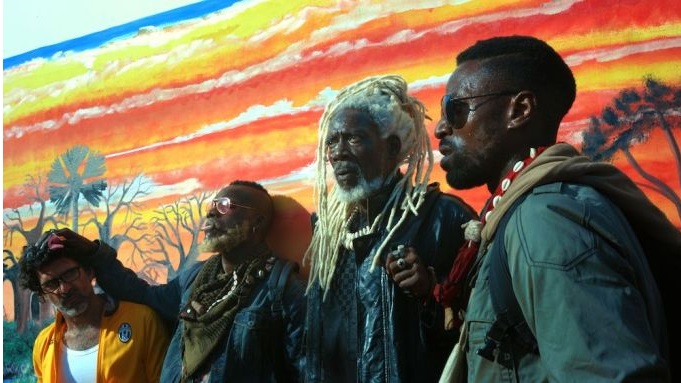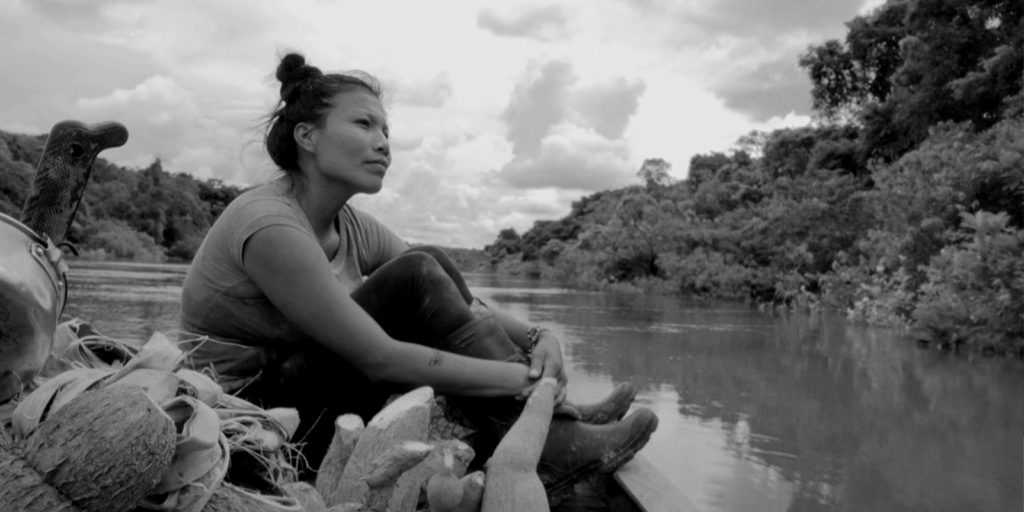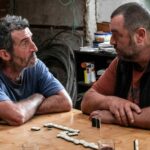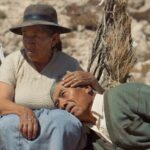This is the first film from Senegal that I have seen, so I had no idea what to expect from a country not known for it’s film industry. Well what a pleasant surprise, a real treat, in fact a gem. Saloum was a kingdom in part of what is now Senegal. The Saloum river forms a big delta where it enters the Atlantic Ocean on the north-western-most point of the African continent. Watching this film felt like digging through the silt in the river delta and uncovering a bar of gold.
The film is a strange and unique melange of genres; part action film, part revenge thriller, part supernatural horror and partly an homage to the ‘spaghetti western’. It opens with 3 colourful, legendary, cutthroat mercenaries, the Bangui Hyenas, who having just orchestrated a coup d’etat, barely escape, flying off in a small plane under a hail of gunfire, carrying with them a captured drug lord and a small fortune in gold. A punctured fuel tank forces the plane to set down in the Saloum delta, where our trio and their prisoner come upon a holiday guest camp that welcomes them to stay. Here we encounter some more equally beguiling and colourful characters.
To say more would only serve to spoil the many unexpected delights and surprises, twists and turns, that are in store for you. The film incorporates some African myths and folklore. It moves at a brisk pace in a taut 84 minutes. It has some nice bits of humour, some excellent music, terrific acting, great camerawork and editing and some very effective CGI of the monstrous creatures. The tension will keep you on the edge of your seat, the music will have you tapping your feet, the fast paced action and horrifying creatures will have your hands tightly gripping the armrests, but after the credits roll, I’m betting that you will leave the theater with a big contented smile on your face, glad to have seen this highlight of the Altered States program.
I’m so glad that I got to see this film and discover some very important history that I knew nothing about. The film centers on Roger Casement, an Irish Nationalist, and diplomat for the British Foreign Office. Casement was a humanitarian activist who is known as the “father of twentieth-century human rights investigations”. During the late 1890’s and the first few years of 1900 Casement investigated the enslavement, mutilation and torture of natives on the rubber plantations in the upper Congo. His reports exposing King Leopold’s genocidal exploitation of these peoples in pursuit of rubber and ivory, led to action by several European nations, culminating in Belgium taking over the administration of the state from Leopold.
In 1906 Casement was sent to Brazil as British Consul, and in 1910 he was ordered to investigate the allegations of crimes against Indigenous communities committed by the British-registered Peruvian Amazon Company. That is the main focus of this documentary film. On a 4 month journey up the Amazon River into the Putumayo region, Casement kept a journal documenting the atrocities that he witnessed. Although he seethed with anger at what he saw, he knew that he would be killed if he tried to intervene. When he finally was out of the region his diaries were published in Britain and this genocide was brought to light.
The film has lots of archival film footage and vintage photos. The film is powerfully narrated by Irish actor Stephen Rea, reading many excerpts from Casements writings. There are also interviews and testimony from descendants of the enslaved and murdered. We learn in the film that the genocide of the indigenous peoples of Putumayo during their enslavement in the rubber trade, reduced the population of approximately 50,000 to a mere 3,000 people. In fact at one point 10,000 of them were herded into a ‘maloca’, a large ancestral long house, and burned alive. This film is not a happy story, but I think that it’s a very important story of some of the horrors of colonialization that needs to be told.
In 1911 Roger Casement received a knighthood for his efforts on behalf of the Amazonian Indians. He retired from the British consular service in 1913. He felt that the exploitation he found in Africa and South America was not unlike what the British were propagating in Ireland, leading him to become involved in the revitalized Irish national movement. Subsequently this led to him travelling to Germany in 1914 to try and solicit help from Germany in the Irish cause. Events ensuing from this resulted in him being arrested, taken to London, charged and tried for treason, found guilty and hung on August 3, 1916.
From the dock Casement spoke: “Where all your rights become only an accumulated wrong; where men must beg with bated breath for leave to subsist in their own land, to think their own thoughts, to sing their own songs, to garner the fruit of their own labours—and even while they beg to see these things inexorably withdrawn from them—then surely it is a braver, a saner, and a truer thing to be a rebel in act and deed against such circumstances as this than tamely to accept it as the natural lot of men.”











